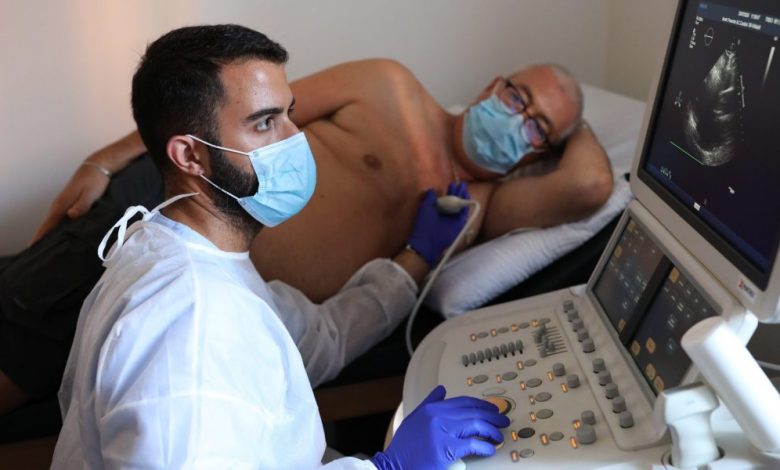COVID increases your risk of heart complications — now and in the future, experts say. This is how you can protect your heart

Long COVID isn’t the only opportunity for the virus to wreak havoc later than expected.
Even a mild case of COVID can put you at an increased risk of heart problems like heart failure and stroke for at least a year, according to a study by researchers at the Veterans Affairs Department. Deaths from heart attacks rose sharply during pandemic flare-ups — particularly among those aged 25 to 44, a normally low-risk population, Cedars-Sinai researchers announced last fall. And new data continue to support these and similar findings.
To find out why and how COVID can affect the heart, Drs. Andrew Marks, a cardiologist and biophysics professor at Columbia University, and Steven Reiken, a researcher in his lab, analyzed heart tissue from people who died from COVID in addition to hearts from mice infected with COVID.
Regarding their findings, which they will present at the 67th Annual Biophysical Society Meeting in San Diego on Monday:
- Human heart tissue shows increased levels of oxidative stress and inflammation and changes in calcium levels due to damage to the system that regulates them in the heart. According to the researchers, such changes can lead to cardiac arrhythmia or heart failure.
- Chest pain and tachycardia, or an abnormally rapid heartbeat, are common long-term in COVID survivors.
- Heart tissue from mice exhibits an increased percentage of fibrosis and fiber dilatation — a common signal of early cardiomyopathy, which makes it harder for the heart to pump blood and can lead to heart failure.
- Heart cell death and blood clots in the heart of mice infected with COVID-19 have also been observed.
“Physicians should be aware of and look for the heart changes associated with COVID-19 infections,” says Marks. He hopes his research will lead to increased awareness among healthcare providers of the virus’s potentially stealthy cardiac consequences — and eventually treatments for those whose hearts have been damaged by the pathogen.
How to maintain heart health in the age of COVID
What can the average person do to protect their heart since COVID is here to stay?
Pre-COVID heart health looks largely the same during COVID, says Dr. Michelle Albert, President of the American Heart Association Wealth.
“Maintaining optimal cardiovascular health is important at every stage of life and can help you live a longer, healthier life,” she says. “Better cardiovascular health has been linked to a reduced risk of heart disease, stroke, cancer, dementia and other major health problems.”
Maintaining good heart health can curb your risk of COVID, she adds, because conditions that increase your risk of serious COVID outcomes, such as obesity and high blood pressure, often overlap with poor heart health.
Albert and the AHA recommend the following:
- control blood pressure
- Eating healthy
- Maintain a healthy weight
- No smoking or vaping
- A practice
- Get enough sleep
- Maintain healthy cholesterol and lipid levels
- Maintain healthy blood sugar levels
The AHA also recommends that people keep up to date on their COVID vaccinations and boosters, and call 911 if they or anyone else has signs of a heart attack or stroke.
In addition, Marks recommends that you continue to mask yourself in public. “There’s still a lot we don’t understand,” he says. “The public should be aware of the risks.”
Learn how to navigate and build trust in your organization with The Trust Factor, a weekly newsletter exploring what leaders need to succeed. Login here.



